BusinessEurope Headlines No. 2016-24
BusinessEurope statement on Brexit
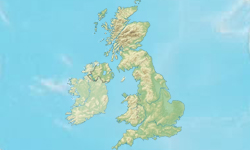 BusinessEurope respects the decision of the voters but regrets that the United Kingdom chose to leave the European Union.
BusinessEurope respects the decision of the voters but regrets that the United Kingdom chose to leave the European Union.
BusinessEurope President Emma Marcegaglia commented: "The European business community continues to strongly believe in the European Union. Brexit opens up factors of uncertainty. We must now focus on the way forward. This set-back makes it only more important to make the necessary reforms in the European Union. We call on EU member states to send a strong signal reconfirming their commitment to the European Union and its three main economic pillars: the single market, the common trade policy and the euro. At the same time, we need to find smart solutions for an orderly Brexit process. Keeping a cool head is essential to minimise the adverse consequences of this vote. We must keep calm and carry on."
Shared roadmap on European social dialogue can foster trust and unity
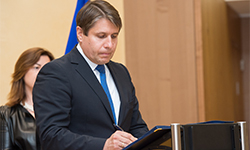 On the occasion of signing a quadri-partite statement on European social dialogue today BusinessEurope Director General Markus J. Beyrer said: “Only a few days after the UK decision to leave the EU, the quadri-partite statement we are signing today is an important and positive outcome for the future of the European social dialogue. This can foster trust and unity at a time when Europe is put to a decisive test. This is the first time we agree on such a shared roadmap between Commission, Council and the European social partners. We now need to translate this into real actions, to really strengthen the capacity of social partners to fully play their role, in particular in countries where they need support. We also count on the Commission to take further steps to associate the social partners more closely into its work, in particular when it comes to the definition of its work program’s priorities.” Photos
On the occasion of signing a quadri-partite statement on European social dialogue today BusinessEurope Director General Markus J. Beyrer said: “Only a few days after the UK decision to leave the EU, the quadri-partite statement we are signing today is an important and positive outcome for the future of the European social dialogue. This can foster trust and unity at a time when Europe is put to a decisive test. This is the first time we agree on such a shared roadmap between Commission, Council and the European social partners. We now need to translate this into real actions, to really strengthen the capacity of social partners to fully play their role, in particular in countries where they need support. We also count on the Commission to take further steps to associate the social partners more closely into its work, in particular when it comes to the definition of its work program’s priorities.” Photos
Photo © European Union, 2016
Read more or contact: Guillaume Cravero
Australia: strengthening ties with a like-minded partner
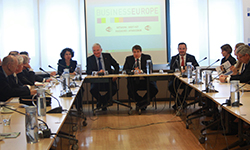 “A new page may open for the EU’s trade and investment relationship with Australia” said Markus J. Beyrer when he met with a delegation of Australian political and businesses leaders on June 29 at BusinessEurope. The meeting was part of a week-long programme for the Australian delegation and took place shortly after the conclusion of the European Commission’s public consultation on the future of EU-Australia and EU-New Zealand trade and economic relations. Business representatives of both sides discussed the main opportunities and challenges they see in the FTA negotiations, expected to be launched as soon as 2017.
“A new page may open for the EU’s trade and investment relationship with Australia” said Markus J. Beyrer when he met with a delegation of Australian political and businesses leaders on June 29 at BusinessEurope. The meeting was part of a week-long programme for the Australian delegation and took place shortly after the conclusion of the European Commission’s public consultation on the future of EU-Australia and EU-New Zealand trade and economic relations. Business representatives of both sides discussed the main opportunities and challenges they see in the FTA negotiations, expected to be launched as soon as 2017.
Contact: Eleonora Catella
BusinessEurope and East African Business Council discusses prospects for future cooperation
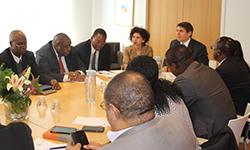 Trade and investment relations between the EU and the East African Community are entering a new phase due to the imminent signature of the Economic Partnership Agreement. This Agreement will not only help create a stable and predictable environment for businesses, but will also put emphasis on achieving sustainable growth and development in the region. In this regard, the role of the private sector is particularly important as - along with other members of the European and East African Civil Society - they will be called to participate in institutional structures overseeing the implementation of the Agreement. Therefore, the timely visit of the East African Business Council (EABC) in BusinessEurope on 28 June was an excellent opportunity to discuss ways to enhance cooperation between European and East African business under the framework of the Economic Partnership Agreement and beyond. BusinessEurope is also particularly interested in the integration process that the East African Community is currently undertaking and is ready to share its experience.
Trade and investment relations between the EU and the East African Community are entering a new phase due to the imminent signature of the Economic Partnership Agreement. This Agreement will not only help create a stable and predictable environment for businesses, but will also put emphasis on achieving sustainable growth and development in the region. In this regard, the role of the private sector is particularly important as - along with other members of the European and East African Civil Society - they will be called to participate in institutional structures overseeing the implementation of the Agreement. Therefore, the timely visit of the East African Business Council (EABC) in BusinessEurope on 28 June was an excellent opportunity to discuss ways to enhance cooperation between European and East African business under the framework of the Economic Partnership Agreement and beyond. BusinessEurope is also particularly interested in the integration process that the East African Community is currently undertaking and is ready to share its experience.
Contact: Sofia Bournou
Discussing TTIP with its opponents
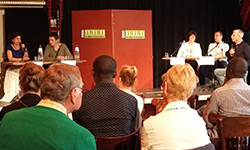 BusinessEurope participated in a debate organised by the anti-TTIP and anti-CETA movement that regroups several NGOs in Belgium. The debate - with the participation of representatives of European consumers and European farmers - allowed for a vivid exchange on some of the issues that have generated much public debate like GMOs, regulatory cooperation and EU vs US standards, investment protection and services. BusinessEurope restated again the areas that are critical for European business and where we expect TTIP to deliver an ambitious and positive outcome. We highlighted regulatory cooperation both at horizontal and sector level, public procurement, energy, GIs but also tariffs or customs procedures that are key to give SMEs more opportunities to access the transatlantic market. Being a complex negotiation between the two major world economies TTIP is also an opportunity to rethink trade and investment rules, adjusting them to today’s reality.
BusinessEurope participated in a debate organised by the anti-TTIP and anti-CETA movement that regroups several NGOs in Belgium. The debate - with the participation of representatives of European consumers and European farmers - allowed for a vivid exchange on some of the issues that have generated much public debate like GMOs, regulatory cooperation and EU vs US standards, investment protection and services. BusinessEurope restated again the areas that are critical for European business and where we expect TTIP to deliver an ambitious and positive outcome. We highlighted regulatory cooperation both at horizontal and sector level, public procurement, energy, GIs but also tariffs or customs procedures that are key to give SMEs more opportunities to access the transatlantic market. Being a complex negotiation between the two major world economies TTIP is also an opportunity to rethink trade and investment rules, adjusting them to today’s reality.
Contact: Luisa Santos
Digital trade enabling exchanges of goods and services
 Digital trade is becoming a key topic in international trade negotiations. BusinessEurope participated in a very timely event - organised by DIGITALEUROPE - on the opportunities digital trade opens up for other parts of business but also on the challenges it faces due to raising barriers. Digital trade can help SMEs better integrate world trade and global supply chains and it is also a way to promote innovative business solutions. Because it is a fast growing and strategic area we also see growing interest from some governments to adopt protectionist measures intended to promote local champions in detriment of competition. These measures range from duty increases to local content requirements, mandatory certification or intrusive testing requirements. We see a new range of barriers appearing, like unjustified data localisation requirements and mandatory local security standards, which are not properly addressed by existing trade rules. For this reason it is increasingly important that effective rules are developed in the area of digital trade.
Digital trade is becoming a key topic in international trade negotiations. BusinessEurope participated in a very timely event - organised by DIGITALEUROPE - on the opportunities digital trade opens up for other parts of business but also on the challenges it faces due to raising barriers. Digital trade can help SMEs better integrate world trade and global supply chains and it is also a way to promote innovative business solutions. Because it is a fast growing and strategic area we also see growing interest from some governments to adopt protectionist measures intended to promote local champions in detriment of competition. These measures range from duty increases to local content requirements, mandatory certification or intrusive testing requirements. We see a new range of barriers appearing, like unjustified data localisation requirements and mandatory local security standards, which are not properly addressed by existing trade rules. For this reason it is increasingly important that effective rules are developed in the area of digital trade.
Photo © DIGITALEUROPE
Contact: Luisa Santos
If wrongly designed, capacity mechanisms could have far-reaching negative consequences
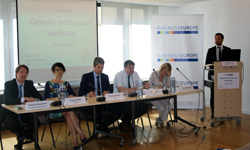 Capacity mechanisms, like any regulatory intervention, have risks associated and it is crucial that EU Member States and the European Commission work to ensure that other options are exhausted before they are pursued. If wrongly designed, without proper coordination at regional or European level, it could have far-reaching negative consequences. These were among the main points of discussion at the workshop organized by BusinessEurope on 23 June, bringing together speakers from the power sector, industrial consumers, European Commission as well as legal and energy experts. The workshop triggered discussions on the role of capacity mechanisms in current energy union and conditions to be met, when introducing such measures.
Capacity mechanisms, like any regulatory intervention, have risks associated and it is crucial that EU Member States and the European Commission work to ensure that other options are exhausted before they are pursued. If wrongly designed, without proper coordination at regional or European level, it could have far-reaching negative consequences. These were among the main points of discussion at the workshop organized by BusinessEurope on 23 June, bringing together speakers from the power sector, industrial consumers, European Commission as well as legal and energy experts. The workshop triggered discussions on the role of capacity mechanisms in current energy union and conditions to be met, when introducing such measures.
Contact: Jan Bambas
Challenges for European companies increase in China, EUCCC business confidence survey finds
 “European companies in China still make profits, but the current challenges are the biggest during the past 15 years” - Adam Dunnett, Secretary General of the European Union Chamber of Commerce in China said at a presentation at BusinessEurope. “Some industries are doing better than others, but European companies are becoming increasingly concerned about the Chinese economy and the slow pace of the reform agenda.” The EUCCC’s annual business confidence survey shows a five-point increase on the difficulty of doing business, with 56% of European companies reporting that doing business has become more difficult for them. Moderating the discussion Luisa Santos, Director of International Relations at BusinessEurope said: “China is an important market and a global player and needs to shoulder responsibility for its domestic challenges in a way that does not impede foreign business.”
“European companies in China still make profits, but the current challenges are the biggest during the past 15 years” - Adam Dunnett, Secretary General of the European Union Chamber of Commerce in China said at a presentation at BusinessEurope. “Some industries are doing better than others, but European companies are becoming increasingly concerned about the Chinese economy and the slow pace of the reform agenda.” The EUCCC’s annual business confidence survey shows a five-point increase on the difficulty of doing business, with 56% of European companies reporting that doing business has become more difficult for them. Moderating the discussion Luisa Santos, Director of International Relations at BusinessEurope said: “China is an important market and a global player and needs to shoulder responsibility for its domestic challenges in a way that does not impede foreign business.”
Read more or contact: Maurice Fermont
Adopting a balanced approach to the collaborative economy
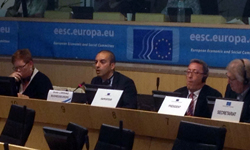 The sharing economy offers big opportunities for Europe. The European Commission’s Agenda for a Collaborative Economy has a balanced approach; it suggests assessing on a case-by-case basis how to apply existing legislation. The EU’s role is particularly important to avoid divergent approaches at national level, which are already creating fragmentation within the single market. Any intervention at EU-level should allow for the huge potential the sharing economy offers, while creating a level playing field between the different service providers. These were the messages conveyed by Guido Lobrano, Deputy Director at BusinessEurope during a hearing at the European Economic and Social Committee on 27 June 2016.
The sharing economy offers big opportunities for Europe. The European Commission’s Agenda for a Collaborative Economy has a balanced approach; it suggests assessing on a case-by-case basis how to apply existing legislation. The EU’s role is particularly important to avoid divergent approaches at national level, which are already creating fragmentation within the single market. Any intervention at EU-level should allow for the huge potential the sharing economy offers, while creating a level playing field between the different service providers. These were the messages conveyed by Guido Lobrano, Deputy Director at BusinessEurope during a hearing at the European Economic and Social Committee on 27 June 2016.
Read more or contact: Guido Lobrano
Standards for digital transformation
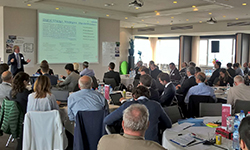 The global context, the relevance of consortia/fora and locating strategic industry interests through a bottom-up approach are vital when leveraging standardisation to support Europe's digital transformation. Speaking on behalf of BusinessEurope Jochen Friedrich conveyed this message on 29 June at a CEN-CENELEC organised event on 'Standards for Digital Transformation'. Successful priority setting for digital standards depends on whether implementers deem them relevant.
The global context, the relevance of consortia/fora and locating strategic industry interests through a bottom-up approach are vital when leveraging standardisation to support Europe's digital transformation. Speaking on behalf of BusinessEurope Jochen Friedrich conveyed this message on 29 June at a CEN-CENELEC organised event on 'Standards for Digital Transformation'. Successful priority setting for digital standards depends on whether implementers deem them relevant.
Contact: Patrick Grant
The EU-Japan FTA could unlock significant business opportunities
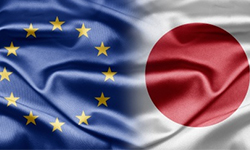 The EU-Japan free-trade agreement has been under negotiation for little over 3 years and stands to offer the European companies significant business opportunities provided it is a comprehensive and ambitious agreement. “We are now at a mature stage in the negotiations, and it is important that both sides accelerate the negotiations in order to conclude the agreement in 2016” - Maurice Fermont, Adviser at BusinessEurope told business representatives at the Federation of Enterprises in Belgium (VBO-FEB). “But without ambitious provisions on market access including geographical indications, public procurement, the removal of non-tariff barriers, services and investment a rapid conclusion will not be possible”, he continued. An ambitious deal could do much to revitalise economic growth in both markets and offer consumers the highest quality products available.
The EU-Japan free-trade agreement has been under negotiation for little over 3 years and stands to offer the European companies significant business opportunities provided it is a comprehensive and ambitious agreement. “We are now at a mature stage in the negotiations, and it is important that both sides accelerate the negotiations in order to conclude the agreement in 2016” - Maurice Fermont, Adviser at BusinessEurope told business representatives at the Federation of Enterprises in Belgium (VBO-FEB). “But without ambitious provisions on market access including geographical indications, public procurement, the removal of non-tariff barriers, services and investment a rapid conclusion will not be possible”, he continued. An ambitious deal could do much to revitalise economic growth in both markets and offer consumers the highest quality products available.
Contact: Maurice Fermont
Calendar
 1 July 2016: Slovak Presidency of the European Union starts
1 July 2016: Slovak Presidency of the European Union starts- 1 July 2016: European Commission visits Slovak EU Presidency
- 8-9 July 2016: EU-US mini summit at NATO summit in Warsaw
- 12 July 2016: Meeting of Eurogroup and ECOFIN Council
- 12-13 July 2016: 11th EU-China business summit in Beijing